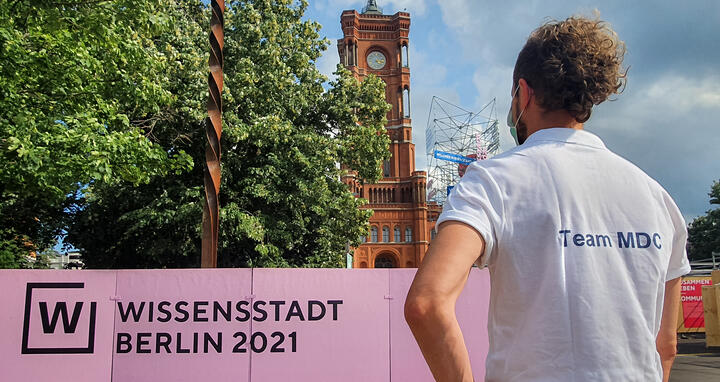📺 Panels, pipettes, and pouring rain
The coronavirus pandemic has caused many events in Berlin to be held outdoors. This includes the action days organized by the Wissensstadt Berlin research festival on the square in front of the Rotes Rathaus, which give citizens an opportunity to learn about science and take part in special activities like Lab Olympics. The MDC had its own booth on July 2 and July 9. “On the second day it was raining, and we were worried that no one would come. But people actually queued up patiently at our booth to take part in the different activities,” says Inga Patarčić, a PhD student at the Max Delbrück Center for Molecular Medicine (MDC) and co-organizer of the MDC’s activities during Wissensstadt Berlin. In the Lab Olympics competition players can earn points by completing various tasks – such as taking precise measurements or transferring liquids using a pipette. The player who has the most points at the end of 30 seconds wins.

The main aim of Wissensstadt Berlin is to bring science to life and tell the story of how the city’s scientists are exploring the big questions of the future – climate, health, and coexistence – and what that research will look like going forward. What counts the most is engaging in dialogue – and having fun, with the Lab Olympics a prime example. “We want to make research accessible to the public and show what it’s like to be a scientist and conduct biomedical research in a modern laboratory,” says Patarčić. In addition to the activity booth, the MDC has organized various workshops and its researchers are participating in panel discussions and other events, such as the Real or Fake quiz show that lets audience members vote on what they believe to be fact or fiction.
Presenting and discussing new approaches to medicine
Simone Spuler is a genetic muscle disease expert at the Experimental and Clinical Research Center (ECRC), a joint institution of Charité – Universitätsmedizin Berlin and the MDC. The researcher and physician participated in two panel discussions: “It’s important to me to engage in a public discussion on gene therapies for muscle diseases,” she says. “I want to explain precisely what we are doing in an easy-to-understand way.”
“It’s important to me to engage in a public discussion on gene therapies for muscle diseases,” she says. “I want to explain precisely what we are doing in an easy-to-understand way.”
The panel did not just explore scientific questions. It brought together people from different areas of society – government, industry, healthcare, and science – to discuss topics such as what role Berlin will play in the cutting-edge research of the future. Stefanie Mahler of the German Stem Cell Network (GSCN) experienced just how exciting that can be. On July 1 she attended the panel discussion on cell therapies, in which MDC researcher Professor Nikolaus Rajewsky participated along with Simone Spuler. The systems biologist outlined a vision of Berlin as a hub for cell therapy that could also prove to be a draw for excellent scientists from other disciplines. Other panelists included Professor Christopher Baum, Chairman of the Board of Directors of the Berlin Institute of Health (BIH), and Dr. Stefan Frank of the pharmaceutical group Bayer. They added perspectives from science policy and industrial research. “There’s a lot happening right now, there’s a pioneering spirit,” said Mahler after the discussion.
Great interest in training opportunities at the MDC
Patarčić, who now works in the Communications Department, has lots of experience in bringing science to the public. She is well acquainted with the Long Night of Sciences, an event in which the MDC has participated for many years. “Presenting science in the middle of the city is quite different than doing so in the outer district of Buch,” she says. “The people come out to the campus are those who already have a strong interest in science or want to see friends or relatives working at the MDC.” Most people end up at the Wissensstadt Berlin at the Rotes Rathaus by accident, and many of them, Patarčić observes, have no connection to research whatsoever. Once at the activity booth, some visitors are particularly interested in career prospects at the MDC. How fitting it is that here they can not only learn about the MDC’s scientific research, but also look through flyers about training opportunities at the Center and talk to researchers about their path to biomedicine.
Text: Wiebke Peters
The MDC will be informing the public about the opportunities and promise of cell-based medicine at the Wissensstadt Berlin exhibition, on the square in front of the Rotes Rathaus, until August 22, 2021.





